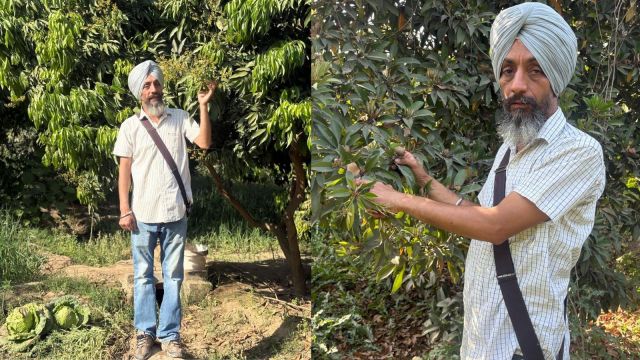15 yrs, 5 acres: How a small farmer grew a thriving business of 80 crops
Despite holding a Ph.D. in Philosophy, where he worked on philosophy and religion, Dr. Simarjit Singh (43) discovered his true calling in farming.
 Farmer Simarjit Singh at his farm with various fruit plants and his products. (Express Photo)
Farmer Simarjit Singh at his farm with various fruit plants and his products. (Express Photo)What began as a humble passion for fruit farming around 15 years ago has blossomed into a thriving business. Starting with just a few local fruits, this dedicated farmer transformed a small 5-acre plot of land into a vibrant orchard of diverse, high-value crops, numbering around 80 in total. Today, the farm proudly produces Israeli apples, almonds, macadamia nuts, Japanese fruits, and exotic mango varieties like Alphonso, Nurjahan, Namdokmai, 4 kg mango, and Brunei King. In addition to these, Malta lemons, Anar Kandahari, white Java (Jamun) fruit, seasonal vegetables, and 30 types of Ayurvedic plants are also grown on his farm.
His five-acre farm demonstrates the hidden potential at the heart of agriculture. He says, “I am not against Minimum Support Price (MSP), but I am more in favor of crop insurance and also want to present a model to fellow farmers showing how they can earn lakhs even from small landholdings instead sitting on dharnas (protests).”
Despite holding a Ph.D. in Philosophy, where he worked on philosophy and religion, Dr. Simarjit Singh (43) discovered his true calling in farming. Over the last four years, he has transformed his hobby into a flourishing commercial business, achieving success that many farmers can only dream of.
Hailing from village Bukkan Singh Nagar near Kotkapura in the Faridkot district, Simarjit, a man with a passion for both academics and agriculture, shared that after teaching for some time, he decided to pursue farming to be closer to nature and open Simar organic Farm. He started planting various fruit trees on his land, which had previously been rented out as his parents were also in teaching job, except for a small portion of about half an acre where his father, who held degrees in Economics and Physical Education, used to train several athletes, visit various countries, and bring back plants from those countries to cultivate fruit trees.
Now, he grows 45 types of mango varieties, including both Indian and imported varieties like Japanese and Thai mangoes. Many of these mangoes have a market price of Rs. 1400 to 1500 per kg, but Simarjit sells them for Rs. 700 to 1000 per kg, bypassing middlemen and benefiting both himself and consumers. Some of his mangoes continue to be harvested well into October, making them several months delicacy in a year.
He has dedicated around one acre to his mango orchard, two acres to guava varieties, half an acre to Japanese fruit (which can earn him around Rs. 9 lakh from just half an acre), and half an acre to four varieties of plums (Aloobukhara), anjeer (fig), black and white Java (Jamun), and rare varities of pomegranate. The remaining one acre is devoted to various other fruits, including 200 trees of Israeli apple varieties, almonds, macadamia nuts, pecan nuts, and nearly 30 varieties of Ayurvedic plants. In addition to these, he practices intercropping with Sona Moti, Khapli, Chapatti Number One, and Bansi Gold wheat varieties, which have low gluten content and are sold for Rs. 8,000 to 14,000 per quintal due to their high nutritional value. He also grows all seasonal vegetables, pulses, turmeric, and millets, and prepares nurseries of various plants for further supply.
Simarjit also grows Desi Gulab (roses) along the boundaries of his fields, selling the dried petals for Rs. 3,500 per kg and making Gulkand (rose petal jam) from them. He proudly mentions that nothing goes to waste on his farm—if there is surplus fruit, it is turned into concentrate for juice, and any damaged fruits are used to make manure.
He has also received certification from various organizations for his organic products, and Punjab Agro is conducting tests, as it provides certification after three years of testing.
“We cannot meet the demand, so now I have decided to purchase more land and even take some on contract to grow more. Currently, around half a dozen farmers are growing several crops for me, and I guide them to maintain the quality and purity,” he said, adding, “All my farm’s production is sold here at my farm. The fruit is available for almost the entire year at my farm, barring a couple of months, and I sell between one to two quintals of fruit daily, in addition to sending produce to the mandi, where buyers demand our fruits. Our vegetables and other crops are sold throughout the year.”
“Even several fruit sellers purchase our produce for their own consumption because they know the difference between chemically and non-chemically grown fruits,” he said.
His farm attracts customers from near and far, including numerous NRIs who purchase dry products like pulses, turmeric, jaggery, wheat, and other herbs.
“Gradually, I am entering processing, which will help me earn at least 8-9 lakh per acre after meeting expenses, which would be double my current earnings,” he said, adding, “My income from one acre is more than triple what wheat and paddy farmers earn annually.”
“I have employed around 15 employees including 5 permanent and remaining part time and there is no debt rather I am going to expand further from the income i earn from my 5-acres,” said he.
He is also into bee keeping and has been managing 500 beehives in partnership with his cousin.
“Farming was in my blood,” he said, by coming into farming he has become a job provider not job seeker and asked fellow farmers to come out of tradtional farming to make big in the farming by sheer hardwork and gaining knowledge”.
Not only is he focused on his own success, but he also strives to give back to the environment and society. He has started planting trees across several vacant areas of the state, at no cost to others, and is even developing a nursery for several types of crops. “We don’t waste anything on our farm,” he said, explaining how even fallen leaves and damaged fruits are recycled into manure, further enriching the soil.
He is also in the process of applying for patents for some of his rare fruit varieties, hoping to protect the unique genetic makeup of his crops for future generations.
Must Read
Buzzing Now
Apr 12: Latest News
- 01
- 02
- 03
- 04
- 05

























